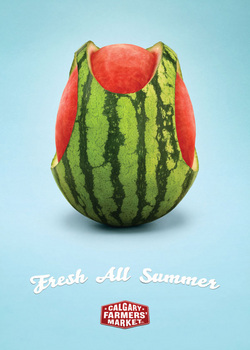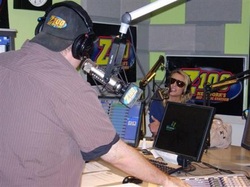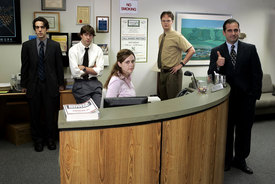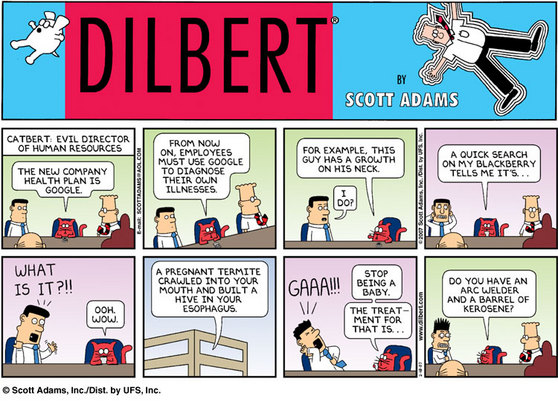Business
Advertising

Using humor in advertising is very risky business (no pun intended), as everyone has a different sense of humor. Often times, the humor insults someone or a certain thing, which could offend the viewers. However, when humor in advertising is done correctly, like in the advertisement on the left, it's very effective for the company. Humor in advertising is a strategy used to attract viewers and convince them to buy their product. Because peoples’ sense of humor is different, the material that the company uses as humor must appeal to different types of consumers. The person behind the creation of the ad must take into consideration different types of people and how they may react to the ad. Though the product may not necessarily be bought more, the brand behind the marketing becomes more well-known.
Let's look at two ads; one using humor ineffectively and the other successfully. The first commercial, for Gary's Gutter Service, isn't so great. While the makers of the commercial may have thought that writing a rap for the ad would make it appeal to a wider audience, it pretty much backfired. The rap is so corny that we can't help but laugh at its stupidity. From a viewer's perspective, this company probably didn't gain too much revenue from this commercial.
The next commercial, for Doritos, was played at this year's Super Bowl. It offers a better reason as to why certain humorous commercials are more effective. While it's a fact that the commercial itself is funny, the company makes us believe that the product is so good that you'll end up eating every last bit of it (even if that means licking someone else's fingers).
Radio

While humor can often be found in advertising, it's even more prevalent in radio station talk shows. Z100, for example, has a talk show in the morning called Elvis Duran and the Z Morning Zoo. They usually discuss news and incorporate humor into it which could contribute to the vast number of listeners Z100 has. The morning talk show is known for its phone taps, where people can write in to try and play a prank on a family member or friend. Once a person is chosen, either they call or a member of the radio station calls the "prank-ee." One popular phone tap is "Mr. Oppenheimer", a man with a calming voice that tries to sell products to people who clearly aren't interested at all. He continues to pester them until he finally announces that they have "been phone tapped."
“Humor, on the other hand, is rare. So rare, it stands out. It engages completely. And, (pay attention because this is really important) as long as the laughter it generates is relevant to your intended audience and messaging strategy, humor has undeniable power in the radio medium.” --- Tom Evans, Morey-Evans AdvertisingEvans continues to point out that just as the radio can be humorous, it can also be boring. To read the rest of this article as well as some other interesting humor-related advertising articles, please click here.
Office Life

Using business as humor is also popular (not only today but in the past, as well) with shows like The Office and Outsourced and musicals like How To Succeed In Business Without Really Trying. These shows poke fun at office behavior and activity. In How To Succeed..., a song titled "Coffee Break" describes how something as simple as running out of coffee in the morning ruins their entire work day, while the actual show tells the comedic story of a young man trying to climb to the top at the World Wide Wicket Company (while balancing a relationship with a secretary). Similarly, The Office follows the lives of office workers at the paper company Dunder Mifflin while tying in immense amounts of humor relating to "office life."
Commercials
Sources:
http://www.youtube.com/watch?v=j4XpqS4KDbI
http://www.youtube.com/watch?v=7UjqLfjsfMk
http://britneyspearsblackout.com/?m=200809
http://www.youtube.com/watch?v=Z-Ezbx9AEyEweeblylink_new_window
http://dvdbaseonline.com/the-office-seasons-16-dvd-boxsetfree-shipping-p-5.html
http://www.youtube.com/watch?v=RuH5Z7vR8Q4
http://www.youtube.com/watch?v=dOUcEED8GW4&NR=1
http://www.isgtw.org/visualization/image-dilbert-and-office-help
http://www.youtube.com/watch?v=ZzEtRrZVFIQ&feature=relmfu
http://www.youtube.com/watch?v=bxcX-aJG-4k
http://www.youtube.com/watch?v=octeqqlM4HU
http://designyoutrust.com/2010/07/20/calgary-farmers-market-fresh-all-summer/
http://www.youtube.com/watch?v=j4XpqS4KDbI
http://www.youtube.com/watch?v=7UjqLfjsfMk
http://britneyspearsblackout.com/?m=200809
http://www.youtube.com/watch?v=Z-Ezbx9AEyEweeblylink_new_window
http://dvdbaseonline.com/the-office-seasons-16-dvd-boxsetfree-shipping-p-5.html
http://www.youtube.com/watch?v=RuH5Z7vR8Q4
http://www.youtube.com/watch?v=dOUcEED8GW4&NR=1
http://www.isgtw.org/visualization/image-dilbert-and-office-help
http://www.youtube.com/watch?v=ZzEtRrZVFIQ&feature=relmfu
http://www.youtube.com/watch?v=bxcX-aJG-4k
http://www.youtube.com/watch?v=octeqqlM4HU
http://designyoutrust.com/2010/07/20/calgary-farmers-market-fresh-all-summer/

